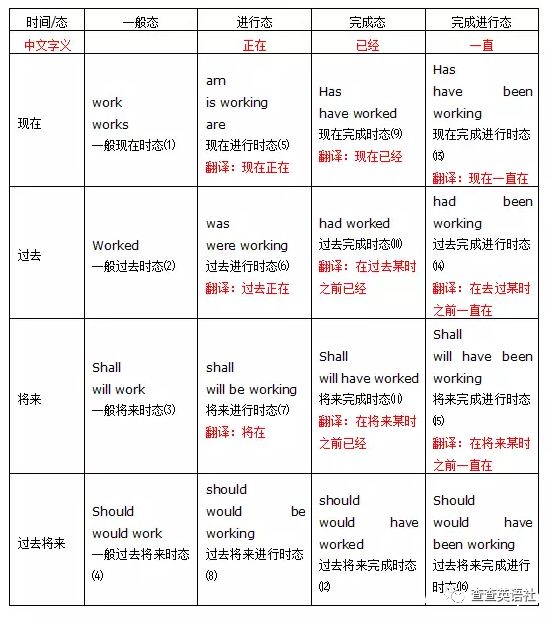
圖片來自網絡
1) 一般現在時:表示一種常態
He likes reading newspaper in the evening rather that in the morning.
2) 一般過去時:發生在過去的某個時間點,有具體時間作狀語
He read(read的過去式) newspaper last night.
3) 現在進行時:正在發生的動作
He is reading newspaper.
4) 現在完成時:對現在的某個時間點有影響,表示動作已經完成
He has finished reading newspaper just now.
5) 一般將來時:在將來要發生或者要去做的事情
He is going to read newspaper after supper. (另,常用will)
6) 過去將來時:在過去的某一時間點的將來要發生的事情
He said he would read newspaper after supper, but he didn’t.
7) 過去完成時:對過去的某個時間點有影響,表示動作已經完成
He had finished reading newspaper by 9 o’clock last night.
8) 過去進行時:在過去的某個時間正在發生的動作
He was reading newspaper when Lily came to him.
9) 現在完成進行時:表示從過去某個時間開始到現在剛剛結束或有可能繼續持續發生的動作
He has been reading newspaper for 2 hours tonight.
10) 過去完成進行時:表示從過去某個時間開始到過去某個時間一直持續的動作,但是已經完成,并且有一定影響
He had been reading newspaper for 2 hours till Lily interrupted.
11) 一般將來進行時:將來某個時間將會進行的動作
He will be reading newspaper from 9 pm to 10 pm in the following days.
12) 過去將來進行時:發生在過去的將來某個正在進行的動作
He said he would be reading newspaper at 9 pm last night.
13) 將來完成時:表示在將來某個時間以前已經完成的一直持續的動作
By the end of year, he will have read newspaper for wholly 40 years.
14) 過去將來完成時:表示發生在過去的將來,某個時間以前已經完成的一直持續的動作
He told me that he would have read newspaper for wholly 49 years by the end of year.
15) 將來完成進行時:表示動作從某一時間一直延續到將來某一時間,是否會繼續,不確定
They will have been cooperating on business for 30 years by the end of month.
16) 過去將來完成進行時:
He told that they would have been cooperating on business for 30 years by the end of month.
來源:英語家園
